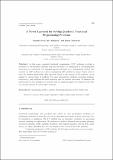Please use this identifier to cite or link to this item:
http://hdl.handle.net/11547/11461Full metadata record
| DC Field | Value | Language |
|---|---|---|
| dc.contributor.author | Sivri, Mustafa | - |
| dc.date.accessioned | 2024-04-15T06:04:55Z | - |
| dc.date.available | 2024-04-15T06:04:55Z | - |
| dc.date.issued | 2021 | - |
| dc.identifier.issn | 1304-2947 | - |
| dc.identifier.issn | 1307-9948 | - |
| dc.identifier.uri | http://hdl.handle.net/11547/11461 | - |
| dc.description.abstract | In this paper, quadratic fractional programming (QFP) problems involving a factorized or non-factorized objective function and subject to homogenous or non-homogenous constraints are considered. Our proposed approach depends on a computational method that converts the QFP problem into a linear programming (LP) problem by using a Taylor series to solve the problem algebraically. This approach, based on the solution of LP problems, can be applied to various types of nonlinear fractional programming problems containing nonlinear constraint(s), and minimizes the total execution time on iterative operations. To illustrate the solution process, two examples arc presented and the proposed approach is compared with other two existing methods for solving QFP problems. | tr_TR |
| dc.language.iso | en | tr_TR |
| dc.relation.ispartofseries | 24;1 | - |
| dc.subject | RANDOMIZED CONTROLLED-TRIAL | tr_TR |
| dc.subject | INTERVENTIONS | tr_TR |
| dc.title | THE EFFECT OF THE POSITIVE PSYCHOLOGY INTERACTION GROUP PROGRAM ON ANGER AND HOPE IN ELDERLY INDIVIDUALS | tr_TR |
| dc.type | Article | tr_TR |
| Appears in Collections: | Web Of Science | |
Files in This Item:
| File | Description | Size | Format | |
|---|---|---|---|---|
| 15_6428_pp199_209.pdf | 1.74 MB | Adobe PDF |  View/Open |
Items in DSpace are protected by copyright, with all rights reserved, unless otherwise indicated.
